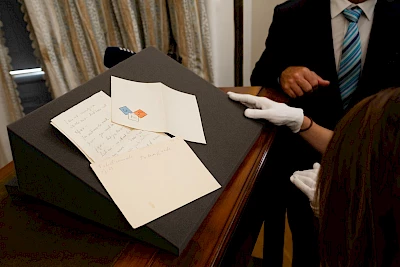Derweil in Tschechien... 36/25
19.09.2025
After 88 years: Masaryk's last words

Almost 90 years after the death of the first President of Czechoslovakia, Tomáš Garrigue Masaryk, his last words have been published. They were contained in a sealed envelope, which was opened on Friday in the presence of President Petr Pavel and Masaryk's great-great-grandson Tomáš Kotík at the Czech presidential summer palace in Lány. Historian Dagmar Hájková then read excerpts from the five-page letter, which was written in English and translated directly into Czech. In it, Masaryk assumes that he will soon die due to his state of health and describes his ideas about his funeral. He also commented on his compatriots ("Our people are all right if they keep calm."), on the far-right Slovak politician Andrej Hlinka ("He is a blockhead because of his politics with the Hungarians. But we have to forgive him.") and about the strong German minority in the country ("The Germans should stay with us."). He also describes himself as no wiser. On the coexistence of Czechs and Germans, he said: "The Czechs are hard-working, the Germans have a certain honesty, but they certainly steal more." And he encourages people to keep talking: "If people are uneducated and stupid, you can't do anything with them. People like to be stupid. But don't make it easy for them: argue with them!" Masaryk urges.
Masaryk's son, diplomat and later Foreign Minister Jan Masaryk, wrote down the last words. The authenticity of the letter was confirmed on the spot, but it is not yet certain when it was written. It may indeed have been dictated in the last days before Masaryk's death on September 14, 1937, but it may also have been written during an earlier phase of a serious illness in 1934, when Masaryk was still president. At the end of 1935, he had resigned from office prematurely after being re-elected for another seven-year term in 1934 at the age of 84. Historians have also pointed out that Masaryk tended to use simple sentences when dictating due to his state of health.
Jan Masaryk gave the envelope with his father's last words to his secretary Antonín Sum, who managed to send the envelope to Masaryk's former secretary Lumír Soukup in Great Britain after the violent communist takeover in February 1948. Jan Masaryk died in March 1948 of unexplained causes. It can be assumed that he was either thrown out of the window of his official residence on behalf of the new communist rulers or was forced to commit suicide.
Soukup returned to Czechoslovakia in 1991 and handed the last words back to Antonín Sum, who had remained in Czechoslovakia. In 1996, Sum, together with Masaryk's grandchildren, came to the conclusion that it was still too early for publication. A year before Sum's death, he gave the envelope to the National Archives. In the meantime, he had sealed the envelope with the proviso that it would not be opened until 20 years after it was handed over.
New plans for the last lignite shaft

It was the last lignite mine in the Czech Republic. Nine years ago, the "Centrum" shaft near Most was closed. This marked the end of the last chapter of underground lignite mining in the Czech Republic. After nine years, a new era is now beginning for the site. The Ministry of Culture had previously allowed the owner, the mining company Sev.en, to demolish the majority of the buildings. Almost all of the buildings were stripped of their monument status, with the exception of a winding tower and a system that took miners to the depths and back and also transported coal. This installation is to be exhibited at the Most Mining Museum in future.
Demolition work is due to begin this year. The site will then be developed for industrial use. A university laboratory for the production of green hydrogen is also planned. This is being developed in cooperation with the nuclear research center in Řež near Prague and the university in Ústí.
New arrival at Děčín Zoo

A sloth has been bringing joy to Děčín Zoo for a few weeks now. For the first time in its 76-year history, the zoo has managed to get a specimen of this species into its care. The former kangaroo house was converted for this purpose. The one-year-old female sloth came from Jihlava Zoo and, according to the zoo, has already settled in well.
But that is not the end of the story. They are planning to breed her and are still waiting for a suitable male. Until then, the zoo wants to prepare the outdoor enclosure for the sloth.
One year after the flood
One year after the devastating floods in the Czech Republic, the T.G. Masaryk Water Research Institute in Prague has estimated the damage at around 70 billion crowns (around 2.8 billion euros). However, this is not yet a final figure.

The heavy rainfall, particularly in the Moravian-Silesian Region and the Olomouc Region, caused severe flooding. The damage was limited, mainly thanks to the early warning system of the Hydrometeorological Office. However, as there were several heavy downpours, the ground was no longer able to absorb the water after the first ones. It was the last rainfall that caused the most serious damage. Without these, the flooding could have been at the level of a flood that only occurs every 50 years. However, more rain fell overall than during the last severe flood in Moravia in 1997.
The towns of Opava, Jeseník and Krnov were the worst affected, as was Ostrava, where the two major railroad stations (the main station and Svinov) were under water for days. However, the floods also caused serious damage in smaller communities in particular. A total of 400 detached houses and apartment buildings were affected. The greatest damage was caused to roads and water infrastructure. In many places, the damage is still visible today. In one year, only 20 percent of the damage could be repaired, especially in the smaller communities.
The willingness to donate in the country was exemplary. Non-governmental organizations collected almost 1 billion crowns (40 million euros) in donations alone.
Czech children eat too little fruit and vegetables
The Czech State Health Office recommends that children eat five child's-fist-sized portions of fruit and vegetables a day to ensure a healthy diet. However, only four percent of all children and their parents adhere to this recommendation. "Many parents think that two to three portions are enough," according to the latest report from the office. On the contrary, children often eat the wrong foods, preferring sweet drinks and flavored dairy products.
Another deficiency identified by the health authority is the lack of important minerals. Calcium is lacking across all generations. Magnesium deficiency is also visible in society as a whole, especially in women and senior citizens. The lowest levels were found in young women between the ages of 15 and 17. Half of women of childbearing age and half of children between the ages of 7 and 10 suffer from iron deficiency. Sodium, on the other hand, is consumed in abundance. The sodium levels of 91 percent of men between the ages of 15 and 59 were well above the norm.
The monitoring also examined the external influences on health and found negative effects from noise in particular, as well as air and water pollution. There was no information on whether the situation had improved or worsened. The results relate to long-term values.
